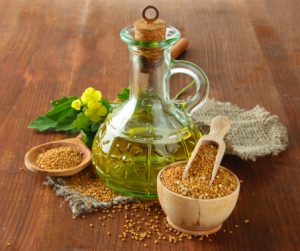
What type of oil are we talking about exactly? The new “super” oil is mustard oil, and it’s great for heart health.
Mustard oil is good for your heart
Mustard oil contains about 60 percent monounsaturated fatty acids (MUFA), 21 percent polyunsaturated fats (PUFA), and 12 percent saturated fat. MUFA and PUFA are known as good fats and have been proven to maintain heart health by lowering bad cholesterol and boosting good cholesterol.
Mustard oil also contains omega 3 and 6, which are beneficial to overall heart health too.
The nutritionist at Columbia Asia Hospital Gurgaon, Parmeet Kaur, explained, “A heart-friendly oil should be cholesterol- and trans-fat-free, low in saturated fat and high in monounsaturated fat and polyunsaturated fat, and should have an ideal N6 to N3 acids ratio as well as a high smoking point. Mustard oil meets all these criteria.”
Studies on mustard oil have revealed that using the oil for cooking could reduce the risk of heart disease by nearly 70 percent. Furthermore, mustard oil has been found to help promote blood circulation and protect against high blood pressure (hypertension).
Although olive oil has long reigned supreme when it comes to heart health, it doesn’t contain the perfect ratios of omegas that are seen in mustard oil. In mustard oil, the ratio of omegas is closer to the recommendations given by the World Health Organization.
Additionally, olive oil isn’t recommended to fry food with as it has a low smoke point, meaning that it burns much faster. This is where mustard oil becomes even more useful, as it has a higher smoke point, making it a better option to fry with.
If you’ve been using olive oil as your primary go-to heart healthy oil, you may want to give mustard oil a try for its added nutrients.
Related: 10 ways to lower your risk of heart disease